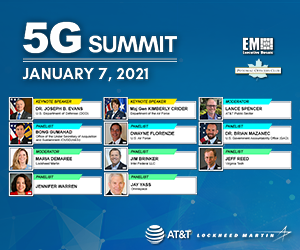
Executive Mosaic is honored to present Michael Kratsios, U.S. chief technology officer with the White House, as an inductee into the 2020 edition of the Wash100 Award for driving artificial intelligence policy, federal integration and security practices.
This marks Kratsios’ second consecutive Wash100 Award. He secured his 2019 Wash100 Award for leading the development of quantum, AI and other technologies designed to enhance business operations. He has continued to drive the development of emerging technologies throughout the year.
Most recently, Kratsios led the development of the Office of Management and Budget (OMB) draft guidance for federal agencies as it relates to AI in Jan. 2020. As agencies develop regulations and policies related to artificial intelligence-based technologies.
The memo outlined the new compliance regulations under the executive order on AI, signed in Feb. 2019, to promote and protect national AI technology and innovation. The draft guidance set 10 principles agencies should consider as they draft regulatory and non-regulatory approaches to the development and deployment of AI applications.
“Removing obstacles to the development of AI means delivering the promise of this technology for all Americans, from advancements in health care, transportation, communication — innovations we haven’t even thought of yet,” Kratsios stated.
The new principles included public trust in AI; public participation; scientific integrity and information quality; risk assessment and management; benefits and costs; flexibility; fairness and non-discrimination; disclosure and transparency; safety and security; and interagency coordination.
“The U.S. AI regulatory principles provide official guidance and reduce uncertainty for innovators about how the federal government is approaching the regulation of artificial intelligence technologies,” Kratsios said. “By providing this regulatory clarity, our intent is to remove impediments to private-sector AI innovation and growth.”
Kratsios has continued to drive new AI initiatives within federal agencies by promoting proactive policies that integrate emerging technology. In Sept. 2019, he announced that the White House will release guidance on how agencies should oversee and regulate AI applications.
“This will be the first document that has legal force around the way that agencies should be looking at regulating artificial intelligence technologies,” Kratsios said. “I think it will set the tone globally on the way that we can be pro-innovation while also protecting American safety.”
He advocated that each agency supervise the development of AI in specific areas and the memorandum will provide agencies a framework for their regulatory approaches with regard to the use of the technology. The memo is also a section of the AI executive order signed in February.
In addition to Kratsios’ work with AI integration and policy, he has spearheaded new initiatives within tech strategy and computing. Kratsios worked alongside the White House Office of Science and Technology Policy and the National Science and Technology Council to revise the 2016 U.S. Strategic Computing Plan in Nov. 2019.
The modification is in response to the emergence of heterogeneous computing systems and growing complexity of software. The report outlines the government’s refocused objectives and the first goal deals with the introduction of new frontiers of digital and non-digital computation to address technological and scientific challenges of the 21st century.
The other two objectives focus on the development and advancement of the country’s computational infrastructure and ecosystem, and expansion of computing partnerships to ensure U.S. leadership in technology, science and innovation.
The document includes recommendations to meet the updated objectives. For the first goal, the U.S. government should adopt a diversity of software and hardware approaches for the future of computing and advance the development and deployment of software tools, systems and frameworks.
“The National Strategic Computing Initiative Update provides a framework to drive the future of computing, improve our computational infrastructure, and create lasting multi-sector partnerships to ensure continued American leadership,” said Kratsios. “These priorities will help ensure next-generation computing will enable technological advancements and scientific discoveries for the benefit of all Americans.”
Executive Mosaic commends Michael Kratsios for his 2020 Wash100 Award. Kratsios’ continued dedication to enhance federal technology policies and supervise development of new initiatives shows that he is a notable figure in the GovCon sector and a leader in the development of new security practices as the complexity of technology advances.
About The Wash100
This year represents our sixth annual Wash100 Award selection. The Wash100 is the premier group of private and public sector leaders selected by Executive Mosaic’s organizational and editorial leadership as the most influential leaders in the GovCon sector. These leaders demonstrate skills in leadership, innovation, achievement, and vision.
Visit the Wash100 site to learn about the other 99 winners of the 2020 Wash100 Award. On the site, you can submit your 10 votes for the GovCon executives of consequence that you believe will have the most significant impact in 2020.





